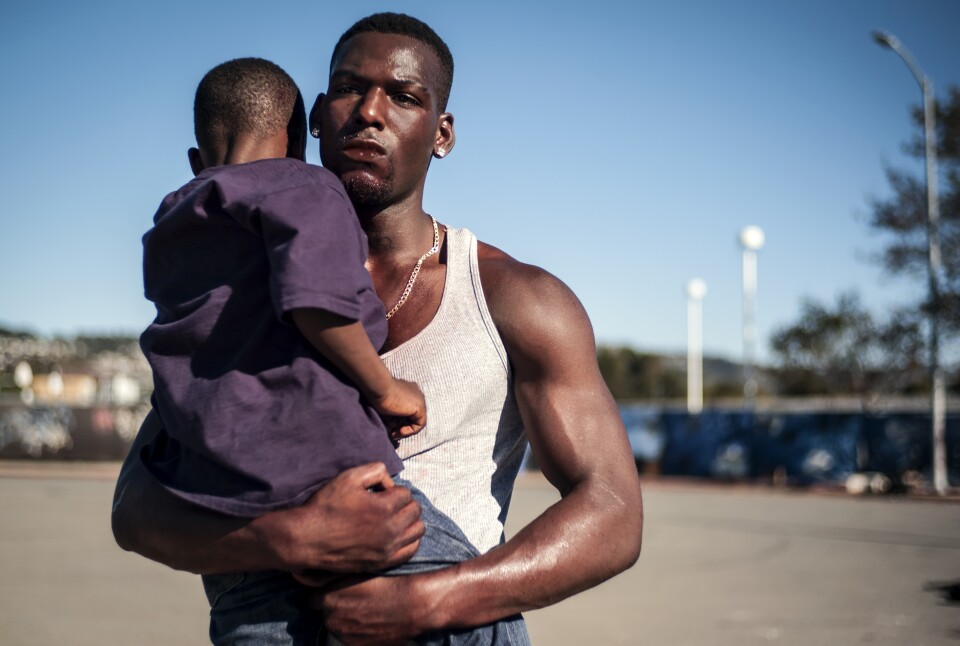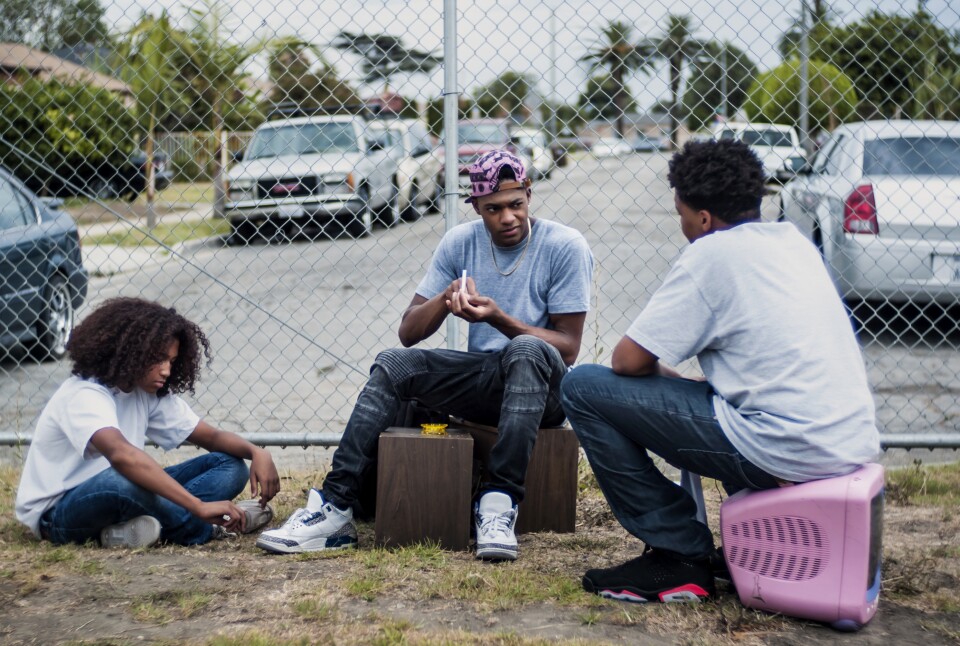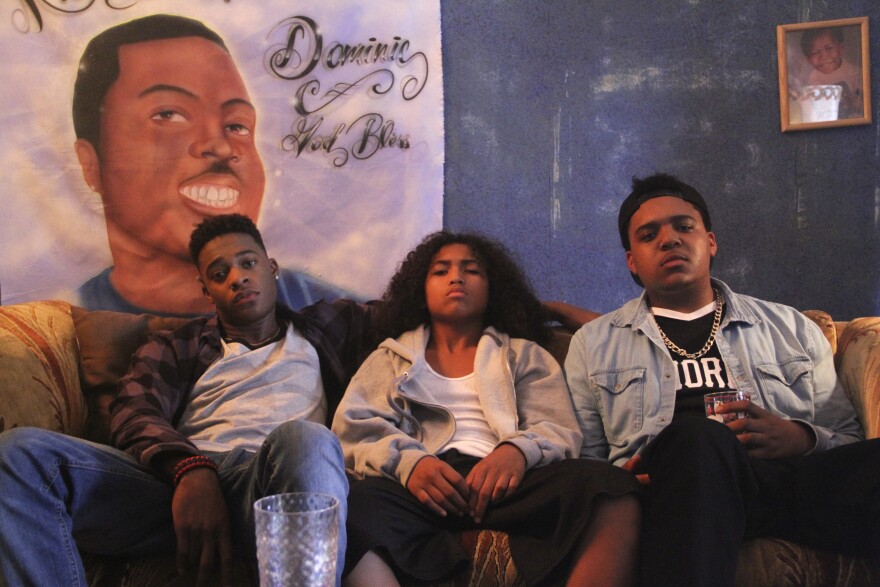"Kicks" filmmakers discuss how being outsiders who didn't fit society's views of manhood fueled the making of their lyrical coming-of-age drama; A new documentary explores why Brad Bird's 1999 animated film "The Iron Giant" was a critical darling, but a box office bomb; Inside Nate Parker's "The Birth of a Nation" press conference at TIFF; Can you scream like Nicholas Cage?
'Kicks' filmmakers wanted to make a 'Stand By Me' of the East Bay
"Kicks" is a new coming-of-age drama set in Oakland and Richmond — neighborhoods in the East Bay, where outside of “Fruitvale Station,” not many movies are set. The story revolves around a poor, young kid ridiculed for his tattered sneakers who dreams of new shoes and hangs around with his buddies trying not to get beat up by aggressive thugs. There are lyrical sequences in slow motion and fantasy scenes with an astronaut.
Justin Tipping, the director and co-writer of "Kicks," grew up in the East Bay. It was a key moment in his childhood that formed the movie's inciting incident. His co-writer and producer Joshua Beirne-Golden grew up in New Jersey — far from Tipping's reality — but the two bonded over feeling as if society's views of manhood didn't apply to them.
Joshua Beirne-Golden: In some way, we made the movie for child Justin and child Josh. We talked a lot in the early phases of making the movie about how we wanted to make something that was a little bit like the movies that we grew up on like "Stand By Me" or like "The Goonies," but that took place where Justin grew up, and to show those kids and their lives in a way that was beautiful and eventful and adventurous and also dealing with the realities of where they are.
The two filmmakers met in film school at the American Film Institute, where they forged a productive partnership. Their short film “Nani” even won a Student Academy Award.
See highlights of the interview below or hear the entire conversation by clicking the play button at the top of the page.
Interview Highlights
How the filmmakers bonded over definitions of manhood:
Joshua Beirne-Golden: We met literally on the first day of film school. You come in with two ideas that you have to pitch for your first short. Justin came in with two ideas. One was "Nani," which won the student Oscar, and the other was "Kicks"... we talked a lot that day, about the idea for "Kicks" and how it was about an emotional journey that we had not seen before. I think, particularly, at the beginning of film school when you're coming from a whole different life set of experiences, you have these overly intimate conversations where you're getting to know everybody and finding out all of their deep dark secrets and what drives them and what they're so excited about. So it just sort of became a conversation. Justin talked about having gotten jumped for his shoes when he was a teenager, and then we talked about that shared experience that we had both had of feeling like it was really hard to define ourselves as men in the world. I think it was this ongoing conversation that we ended up finding at that intersection.

On growing up in opposite worlds feeling like "outsiders":
Beirne-Golden: I grew up gay and I think knowing when I was a teenager that I was gay and feeling like this idea of masculinity that I felt like I had to live up to in a big way, was something that felt like just one of the most formative experiences of my entire life. It was like this burden that I couldn't get out from under, and then as I got older, I realized that it was probably a lot of it self-imposed and a lot of it also imposed by society. So it was something that I had not worked through entirely.
Justin Tipping: You weren't allowed to express your emotions — the full gamut of your emotions. It felt like you could only be angry. That was the one thing that was okay. As soon as you started to be like, "I feel vulnerable," then you'd be called a p---- or a b---- and you weren't manning up. Even in the language, I look back at my young self and the kids I was hanging out with. If you didn't like something or if something was stupid, you'd be like, that's hella gay, because you're so afraid that's not falling into the box of what it means to be a man — that you're so insecure you have to say it out loud to the world just so everyone doesn't get the wrong idea. Especially, the idea of men crying in front of their families or children. You have to be this patriarchal figure that's so stoic and emotionless.

Beirne-Golden: I think it's particularly tough when you are inherently a really emotional person. I think we all are. But I think the common ground we found was that we both were really emotional kids. We grew up feeling a little bit like outsiders in very different ways. When you already feel like that way and then this burden comes in, I think sometime around adolescence, and this idea that you have to live up to being a certain kind of way, it can feel pretty heavy. So that's probably that common ground we found.
On screening "Kicks" in the East Bay:
Tipping: I've been thinking about that since day one of inception. I think that's probably going to be the most rewarding — I'm getting emotional just thinking about it because now that it's coming out, it's been [a] whirlwind in seeing people's reactions. I honestly am just like, I just want to go to Richmond and sit in a theater with a bunch of kids and see what happens. That's the most exciting thing to me, because that's really who we are trying to reach and to hopefully change minds or change point of views or help a kid in a similar situation feel a little less lonely. It's weird because you sit there and think about all the universal themes, but at the end of the day, that's the most important audience for us.

Beirne-Golden: Yeah that would be the most special thing, will be to see people who we made the movie for — and in a lot of cases made the movie with. I mean, so many of the cast members are people from these communities, and they were such a huge part of the fabric of the film, so to see that reaction I think will be beyond special.
“Kicks” is in limited theatrical release now and goes wider Sept. 16.
Brad Bird explains why 'The Iron Giant' bombed at the box office
Today, many kids and grownups alike consider the animated movie “The Iron Giant” a classic — but when it came out in August 1999, it was a box office bomb.
Directed by Brad Bird, who went on to direct “The Incredibles” and “Ratatouille” for Pixar, the movie was based on a novel by the British poet Ted Hughes. Critics liked it, but when it only made $23 million on a budget of $50 million, it helped nail the coffin on Warner Brothers’ short-lived attempt to compete with Disney in the traditional animation game.
This week, a Blu-ray release of “The Iron Giant” features a new, hour-long documentary about what went into the making of the movie — and what went wrong.
Bird: Back then, the overriding thing was, if you’re doing an animated film, it should be a public domain property, set to music. And our story was not familiar to most audiences, other than in England. And then for us to set it in 1957, and have it deal with things like the Cold War, was definitely not considered the kind of things you do in an animated film. Where is the fairy tale? Where is the magic? And where’s the singing?
In “The Giant’s Dream,” Bird describes how he fell in love with animation watching classic Disney films as a kid. He was hired by Disney’s animation department after college, but that was during their wilderness years of the 1980s, and he wound up leaving in frustration. Bird went on to work as an artist and director on “The Simpsons.
Bird: The movie business at large, it’s nomadic. You know, you assemble your creative team, you make the film, and then the team disbands. Well, in animation it’s so time-intensive, and it’s got a million moving parts, and you really have to build a team, and then you have to hold the team together. So they were trying to follow the Disney model of having a division. But they didn’t realize that Disney took years to build that division.
Bird wanted to go against the Disney grain and make a songless adventure movie about a boy and a robot, that attempts to answer the simple question: “What if a gun had a soul and didn’t want to be a gun?”
He had one-third the budget and half the time of the typical animated feature, and a crew of mostly young and inexperienced animators. When another Warner Brothers animated feature, “Quest for Camelot,” came out and tanked, the studio began looking for the exit sign.
Bird: They spent a lot of money on a lot of not-very-well conceived projects, and they were kind of exiting the stage. And it was cheaper to have us finish our film than to scrap it. So we were finished — but they didn’t really have any expectations for us. So the great thing when we were making it was that, as long as we produced it efficiently, they left us alone. And the terrible thing about it is that when it came time to come out, they [laughing] kind of left us alone.
“The Giant’s Dream” explores this story in great detail, using new interviews with several alumni from “The Iron Giant” and home movie footage of story meetings. The documentary was directed by Anthony Giacchino, younger brother of composer Michael Giacchino, who has scored all of Bird’s films since “The Incredibles.” Anthony is a historical documentarian, and he applied those chops to examine how a good movie like “The Iron Giant” could go bust.
Giacchino: It did incredibly well with test audiences, and Warner Brothers said, ‘Hey, maybe we should hold off and market this properly?’ And the filmmakers were concerned that if they sort of delayed a year, that Warner Brothers would never release it. They certainly didn’t give it the attention all the way through that they may have. I mean, they had about four months to market the film. Brad told me, you know, ‘Warner’s said we should have waited. I said no. They listened to me.’ And he said, ‘They probably shouldn’t have listened to me.’
Even though the movie lost at the box office in ’99, it helped launch Brad Bird’s Oscar-winning career and the careers of several animators — and the film itself eventually found a passionate audience.
Bird: The movie business is very strange. It’s kind of a dream language, and it’s more about what feels right. I can’t tell you how much bogus knowledge I’ve been given, you know, with absolute confidence, by people who were 100 percent wrong [laughs]. I think you just have to kind of connect with your own emotions and why you enjoy the experience of going to the movies, and take it from there.
There's a website that compares your scream to Nic Cage
If you ever wondered how your scream compares to actor Nicolas Cage, well, your prayers have been answered.
The Nic Cage Rage Page is a website that ranks your scream on a scale from 1 to Cage — 1 being the lowest and Cage being the bee scene in "The Wicker Man".
The site has a picture of the actor in one of his quintessential screaming faces with a button below that says, "Scream For Me." Once you click the button, you scream into the microphone on your computer or smartphone as loud as you can.
The company behind the webpage is called jane.works, which says:
No one screams like Nic Cage. It's part feral beast, part existential crisis. Something so contradictory, yet so pure.
So we created this web page, where fans of Nicolas Cage can finally answer the question: can I "Rage Like Cage”?
The Frame's John Horn tested out his vocal chops. He got a 5 out of Cage.




